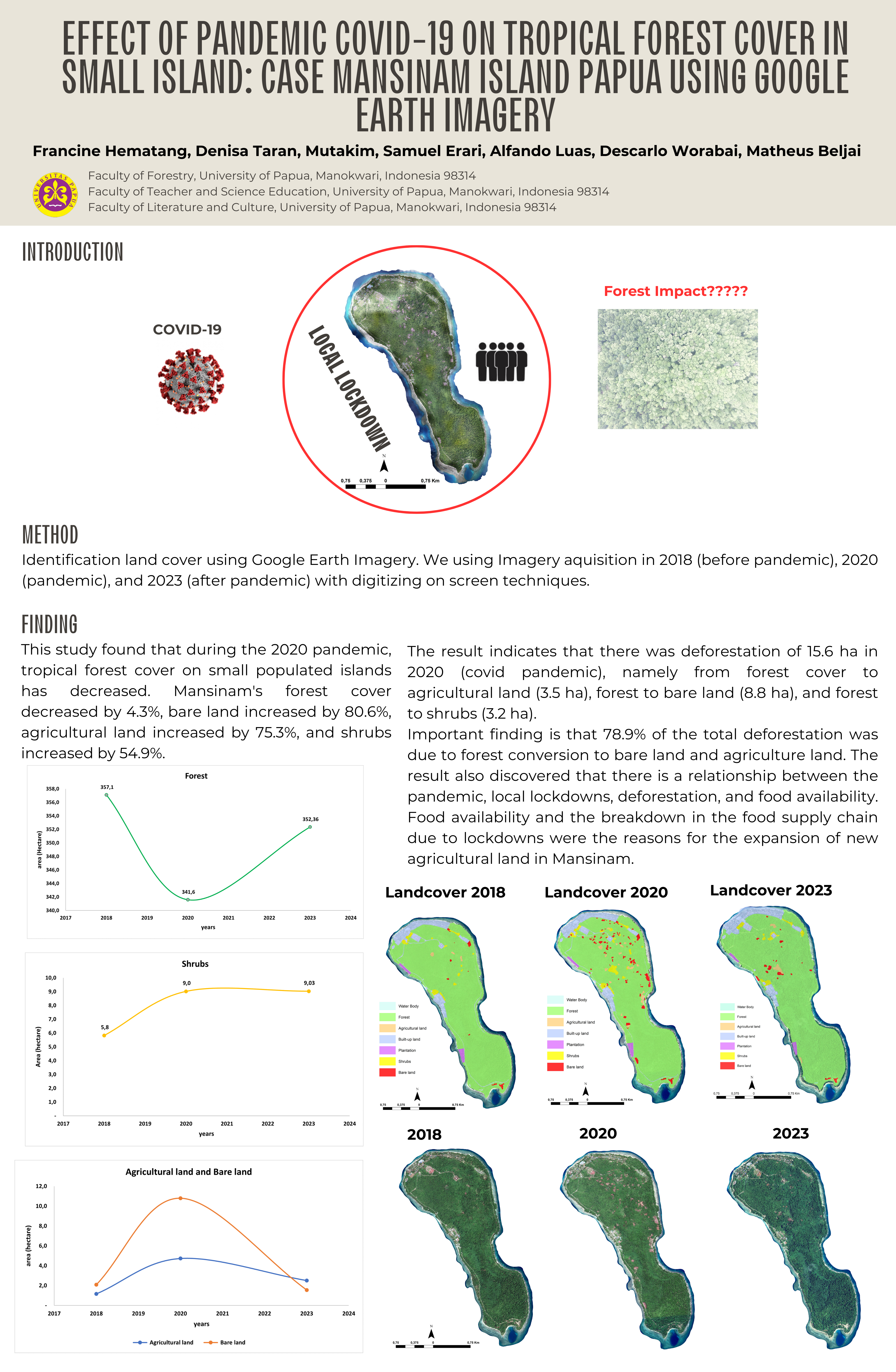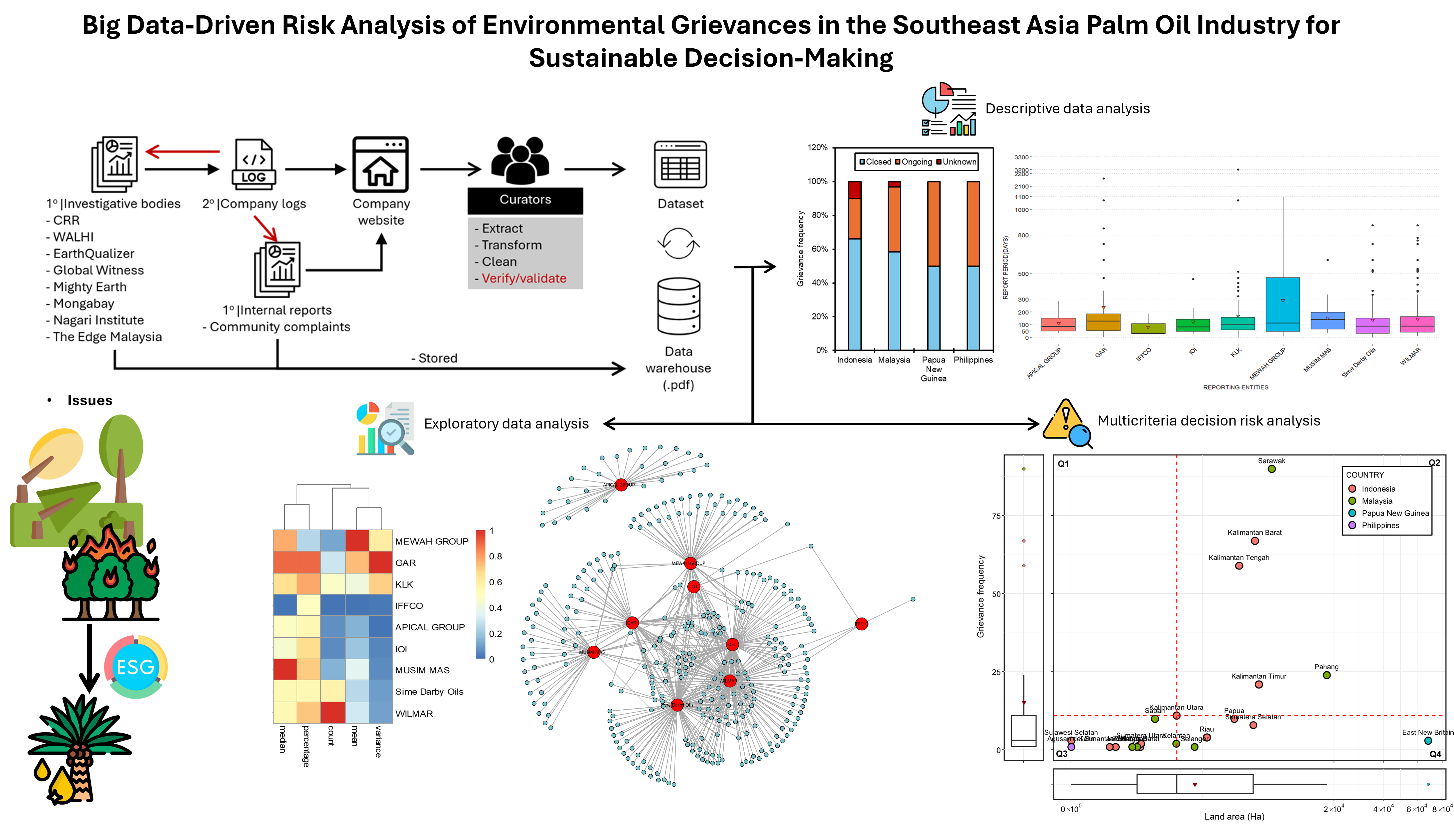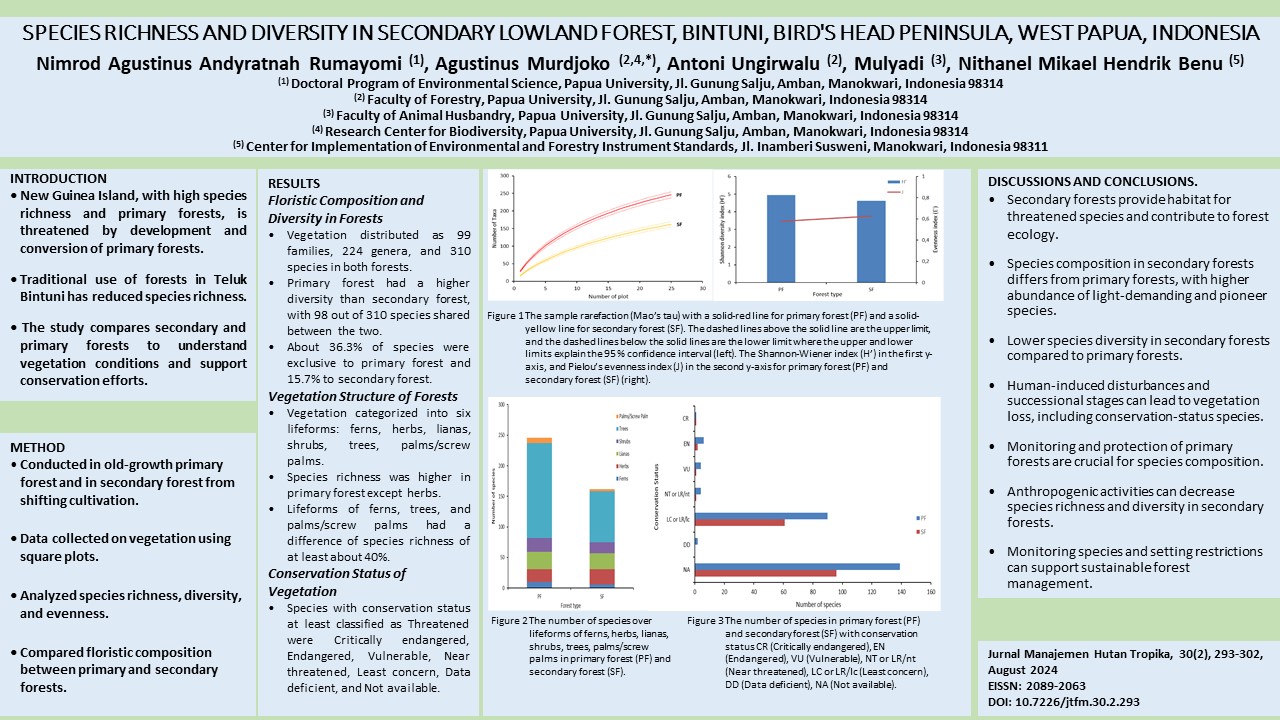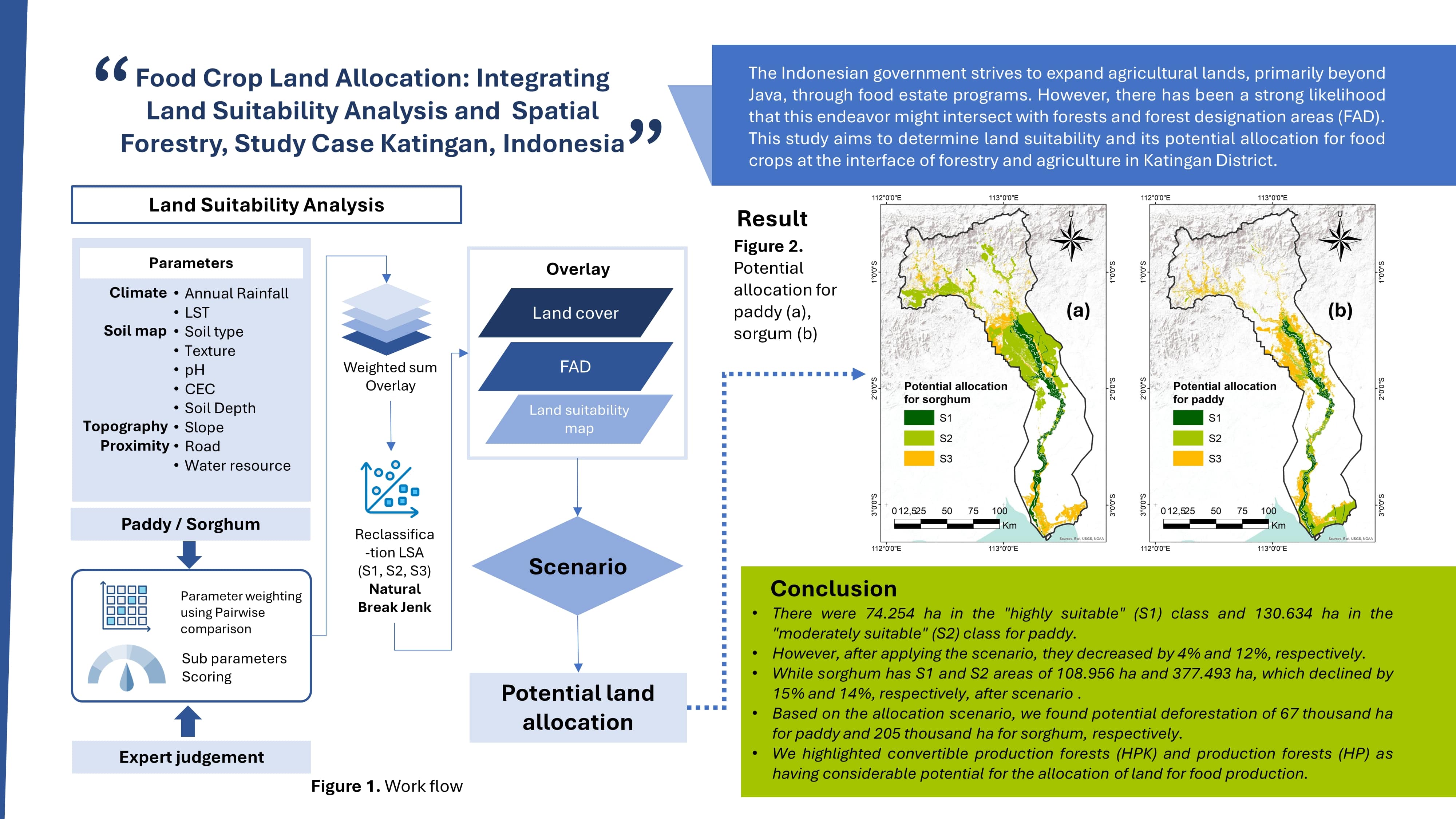Effect of Pandemic COVID-19 on Tropical Forest Cover in Small Island: Case Mansinam Island Papua using Google Earth Imagery
Abstract
Covid-19 became a global pandemic in 2020 and has multiple impacts on the economy, social, culture, food systems, and also the environment, especially on tropical forest cover in small island. This study aims to determine the impact of the Covid-19 pandemic on the forest cover of small populated islands. Using remote sensing and geographic information system technology based on high-resolution satellite imagery from google earth imagery, land cover was observed in 2018, 2020, and 2023. This study found that during the 2020 pandemic, tropical forest cover on small populated islands has decreased. Mansinam's forest cover decreased by 4.3%, bare land increased by 80.6%, agricultural land increased by 75.3%, and shrubs increased by 54.9%. Another important finding is that 78.9% of the total deforestation was due to forest conversion to bare land and agricultural land. Land and forest utilization on small islands will increase when accessibility is limited, especially during the pandemic. Future studies will be on the structure and composition of species in locations that experienced deforestation during the pandemic and detailed studies related to changes in the occupations of Mansinam people due to the pandemic that have a relationship with forests.
References
Abebe, G., Getachew, D., & Ewunetu, A. (2022). Analysing land use/land cover changes and its dynamics using remote sensing and GIS in Gubalafito district, Northeastern Ethiopia. SN Applied Sciences, 4, Article 30. https://doi.org/10.1007/s42452-021-04915-8
Ang, L., Hernández-Rodríguez, E., Cyriaque, V., & Yin, X. (2023). Covid-19’s environmental impacts: Challenges and implications for the future. Science of the Total Environment, 899, Article 165581. https://doi.org/10.1016/j.scitotenv.2023.165581
Badan Pusat Statistik Papua Barat. (2023). Papua Barat Province in figures 2023. Manokwari: Statistics Agency of Papua Barat Province.
Bäuerle, A., Teufel, M., Musche, V., Weismüller, B., Kohler, H., Hetkamp, M., Dörrie, N., Schweda, A., & Skoda, E. M. (2020). Increased generalized anxiety, depression and distress during the Covid-19 pandemic: A cross-sectional study in Germany. Journal of Public Health (United Kingdom), 42(4), 672–678. https://doi.org/10.1093/pubmed/fdaa106
Bell, M. L., Pollitt, K. J. G., & Deziel, N. C. (2023). Covid-19 and the environment: The pandemic and beyond. Environmental Research Letters, 18(9), Article 092001. https://doi.org/10.1088/1748-9326/acedc8
Bhandari, M. S., Pandey, S., Dabral, A., Meena, R. K., & Kant, R. (2021). Global forestry perspective: Covid-19 impact and assessment. National Academy Science Letters, 44(6), 571–574. https://doi.org/10.1007/s40009-021-01062-x
Bilan, Y., Vysochyna, A., Vasylieva, T., Grytsyshen, D., & Smutka, L. (2023). Impact of coronavirus disease (Covid-19) on food security: bibliometric analysis and empirical evidence. Frontiers in Sustainable Food Systems, 7, Article 1126454. https://doi.org/10.3389/fsufs.2023.1126454
Brancalion, P. H. S., Broadbent, E. N., de-Miguel, S., Cardil, A., Rosa, M. R., Almeida, C. T., Almeida , D. R. A., Chakravarty, S., Zhou, M., Gamarra, J. G. P., Liang, J., Crouzeilles, R., Hérault, B., Aragão, L. E. O. C., Silva, C. A., & Almeyda-Zambrano, A. M. (2020). Emerging threats linking tropical deforestation and the Covid-19 pandemic. Perspectives in Ecology and Conservation, 18(4), 243–246. https://doi.org/10.1016/j.pecon.2020.09.006
Chebby, F., Mmbaga, N., & Ngongolo, K. (2023). Land use land cover change and socio-economic activities in the Burunge wildlife management area ecosystem during Covid-19. Heliyon, 9(3), Article e14064. https://doi.org/10.1016/j.heliyon.2023.e14064
De, A., & Maitra, A. (2021). Five years change of land use land cover concerning Covid-19 lockdown and amphan cyclone using GIS technique over a location in Sundarban. Proceedings of the Kleinheubach Conference, KHB 2021, 1–3. https://doi.org/10.23919/IEEECONF54431.2021.9598446
Diack, I., Diene, S. M., Louise, L., Aziz, D. A., Benjamin, H., Olivier, R., Philippe, L., Alain, A., Idrissa, S., & Moussa, D. (2024). Combining UAV and Sentinel-2 imagery for estimating Millet FCover in a heterogeneous agricultural landscape of Senegal. IEEE Journal of Selected Topics in Applied Earth Observations and Remote Sensing, 17, 7305–7322. https://doi.org/10.1109/JSTARS.2024.3373508
Direktorat Jenderal Kekayaan Negara. (2023, April). Pandemi Covid-19 dan menurunnya perekonomian Indonesia. Direktorat Jenderal Kekayaan Negara. https://www.djkn.kemenkeu.go.id/artikel/baca/16064/Pandemi-Covid-19-Dan-Menurunnya-Perekonomian-Indonesia.html
Forum Generasi Muda GKI Papua Barat. (2022). Persepsi masyarakat terhadap rencana pembangunan Pulau Mansinam, Manokwari-Papua Barat. Manokwari: Forum Generasi Muda GKI Papua Barat.
Food and Land Use Coalition. (2020). Ringkasan studi pangan dan tata guna lahan (FOLU) di Provinsi Papua Barat. https://econusa.id/pdf/2460494folu_compressed.pdf
Friedl, M. A., Woodcock, C. E., Olofsson, P., Zhu, Z., Loveland, T., Stanimirova, R., Arevalo, P., Bullock, E., Hu, K-T., Zhang, Y., Turlej, K., Tarrio, K., McAvoy, K., Gorelick, N., Wang, J. A., Barber, C. P., & Souza, C. (2022). Medium spatial resolution mapping of global land cover and land cover change across multiple decades from Landsat. Frontiers in Remote Sensing, 3, Article 894571. https://doi.org/10.3389/frsen.2022.894571
Ghosh, S., Kumar, D., & Kumari, R. (2022). Cloud-based large-scale data retrieval, mapping, and analysis for land monitoring applications with google earth engine (GEE). Environmental Challenges, 9, Article 100605. https://doi.org/10.1016/j.envc.2022.100605
Golar, G., Malik, A., Muis, H., Herman, A., Nurudin, N., & Lukman, L. (2020). The social-economic impact of Covid-19 pandemic: Implications for potential forest degradation. Heliyon, 6(10), Article e05354. https://doi.org/10.1016/j.heliyon.2020.e05354
Guo, Q., & Lee, D. C. (2022). The ecology of Covid-19 and related environmental and sustainability issues. Ambio, 51(4), 1014–1021. https://doi.org/10.1007/s13280-021-01603-0
Halimatussadiah, A., Edwards, R., Moeis, F. R., & Maulia, R. F. (2022). Agriculture, Development and Sustainability in the Covid-19 Era. Bulletin of Indonesian Economic Studies, 58(1), 1–30. https://doi.org/10.1080/00074918.2022.2056935
Hematang, F., Murdjoko, A., Hendri, H., & Tokede, M. (2022). Application of unmanned aerial vehicle (UAV) for estimation of tree height in heterogeneous forest. Biosaintifika: Journal of Biology & Biology Education, 14(2), 168–179. https://doi.org/10.15294/biosaintifika.v14i2.35637
Hematang, F., Murdjoko, A., Kesaulija, F., Marwa, J., & Ungirwalu, A. (2024). Grouping land cover using orthophoto in small islands: An application of low-cost UAV on Mansinam Island. Forum Geografi, 38(2), 189–202. https://doi.org/10.23917/forgeo.v38i2.4870
Hu, Q., Wu, W., Xia, T., Yu, Q., Yang, P., Li, Z., & Song, Q. (2013). Exploring the use of google earth imagery and object-based methods in land use/cover mapping. Remote Sensing, 5(11), 6026–6042. https://doi.org/10.3390/rs5116026
Jallu, S. B., Shaik, R. U., Srivastav, R., & Pignatta, G. (2022). Assessing the effect of Covid-19 lockdown on surface urban heat island for different land use/cover types using remote sensing. Energy Nexus, 5, Article 100056. https://doi.org/10.1016/j.nexus.2022.100056
Jayasundara, M., Kadam, P., & Dwivedi, P. (2024). The impact of Covid-19 on the global forestry sector–A bibliometric analysis-based literature review. Forest Policy and Economics, 158, Article 103103. https://doi.org/10.1016/j.forpol.2023.103103
Jodhani, K. H., Gupta, N., Parmar, A. D., Bhavsar, J. D., Patel, D., Singh, S. K., Mishra, U., Omar, P. J., & Omar, G. J. (2024). Unveiling seasonal fluctuations in air quality using google earth engine: A case study for Gujarat, India. Topics in Catalysis, 67, 961–982. https://doi.org/10.1007/s11244-024-01957-1
Kementerian Lingkungan Hidup dan Kehutanan. (2022, April 1). Rencana operasional Indonesia’s forestry and other land use net sink 2030. https://phl.menlhk.go.id/publikasi/rencana-operasional-indonesias-forestry-and-other-land-use-folu-net-sink-2030/
Kurniasari, D. R., Wibowo, L. R., Seraphine, N., & Kurniawan, A. S. (2023). Healing forests as potential natural resources for visitor health therapy in the post-pandemic period. IOP Conference Series: Earth and Environmental Science, 1266(1), Article 012004. https://doi.org/10.1088/1755-1315/1266/1/012004
Laborde, D., Martin, W., Swinnen, J., & Vos, R. (2020). Covid-19 risks to global food security. Science, 369(6503), 500–502. https://doi.org/10.1126/science.abc4765
Letsoin, S. M. A., Herak, D., Rahmawan, F., & Purwestri, R. C. (2020). Land cover changes from 1990 to 2019 in Papua, Indonesia: Results of the remote sensing imagery. Sustainability, 12(16), Article 6623. https://doi.org/10.3390/su12166623
Li, W., Dong, R., Fu, H., Wang, J., Yu, L., & Gong, P. (2020). Integrating Google Earth imagery with Landsat data to improve 30-m resolution land cover mapping. Remote Sensing of Environment, 237, Article 111563. https://doi.org/10.1016/j.rse.2019.111563
Malarvizhi, K., Kumar, S. V., & Porchelvan, P. (2016). Use of high resolution google earth satellite imagery in landuse map preparation for urban related applications. Procedia Technology, 24, 1835–1842. https://doi.org/10.1016/j.protcy.2016.05.231
Maraseni, T., Poudyal, B. H., Aryal, K., & Laudari, H. K. (2022). Impact of Covid-19 in the forestry sector: A case of lowland region of Nepal. Land Use Policy, 120, Article 106280. https://doi.org/10.1016/j.landusepol.2022.106280
Naveed, N., Ahmad, K., Majeed, H., Qureshi, K., Ahmad, I., Awan, M. F., Iftikhar, T., Ahmad, S., Noreen, F., Amin, M. A., & Batool, H. (2024). The Global Impact of Covid-19: A Comprehensive Analysis of Its Effects on Various Aspects of Life. Toxicology Research, 13(2), Article tfae045. https://doi.org/10.1093/toxres/tfae045
O’Hara, S., & Toussaint, E. C. (2021). Food access in crisis: Food security and Covid-19. Ecological Economics, 180, Article 106859. https://doi.org/10.1016/j.ecolecon.2020.106859
Olfato-Parojinog, A., Sobremonte-Maglipon, P. A., Limbo-Dizon, J. E., Almadrones-Reyes, K. J., & Dagamac, N. H. A. (2023). Land use/land cover changes (LULCC) using remote sensing analyses in Rizal, Philippines. GeoJournal, 88(6), 6105–6118. https://doi.org/10.1007/s10708-023-10959-7
Potere, D., Schneider, A., Angel, S., & Civco, D. L. (2009). Mapping urban areas on a global scale: Which of the eight maps now available is more accurate? International Journal of Remote Sensing, 30(24), 6531–6558. https://doi.org/10.1080/01431160903121134
Rafii, A. M., & Millang, S. (2021). Implications of the Covid-19 pandemic on fire hazards forest and land in Barru District, South Sulawesi. IOP Conference Series: Earth and Environmental Science, 886(1), Article 12001. https://doi.org/10.1088/1755-1315/886/1/012001
Rahman, M. S., Alam, M. A., Salekin, S., Belal, M. A. H., & Rahman, M. S. (2021). The Covid-19 pandemic: A threat to forest and wildlife conservation in Bangladesh? Trees, Forests and People, 5, Article 100119. https://doi.org/10.1016/j.tfp.2021.100119
Ranjan, A. K., Dash, J., Xiao, J., & Gorai, A. K. (2022). Vegetation activity enhanced in India during the Covid-19 lockdowns: evidence from satellite data. Geocarto International, 37(26), 12618–12637. https://doi.org/10.1080/10106049.2022.2071469
Sanudin, Widiyanto, A., Fauziyah, E., & Sundawati, L. (2023). Agroforestry farmers’ resilience in social forestry and private Forest programs during the Covid-19 pandemic in Indonesia. Forest Science and Technology, 19(3), 197–209. https://doi.org/10.1080/21580103.2023.2222156
Sarkodie, S. A., & Owusu, P. A. (2021). Global assessment of environment, health and economic impact of the novel coronavirus (Covid-19). Environment, Development and Sustainability, 23(4), 5005–5015. https://doi.org/10.1007/s10668-020-00801-2
Singhal, V., Jinger, D., Rathore, A., Pal, R., Samal, I., Bhoi, T., Paramesh, V., Fahad, S., Jaremko, L., Abdelsalam, N. R., & Jaremko, M. (2024). Covid-19, deforestation, and green economy. Forest and Global Change, 6, Article 1305779. https://doi.org/https://doi.org/10.3389/ffgc.2023.1305779
Sopaheluwakan, W. R. I., Fatem, S. M., Kutanegara, P. M., & Maryudi, A. (2023). Two-decade decentralization and recognition of customary forest rights: Cases from special autonomy policy in West Papua, Indonesia. Forest Policy and Economics, 151, Article 102951. https://doi.org/10.1016/j.forpol.2023.102951
Stensgaard, A. S., Saarnak, C. F. L., Utzinger, J., Vounatsou, P., Simoonga, C., Mushinge, G., Rahbek, C., Møhlenberg, F., & Kristensen, T. K. (2009). Virtual globes and geospatial health: The potential of new tools in the management and control of vector-borne diseases. Geospatial Health, 3(2), 127–141. https://doi.org/10.4081/gh.2009.216
Suwito, D., Suratman, & Poedjirahajoe, E. (2021). The Covid-19 pandemic impact on indigenous people livelihoods in the peat swamp forest ecosystem in Central Kalimantan Indonesia. IOP Conference Series: Earth and Environmental Science, 894, Article 012023. https://doi.org/10.1088/1755-1315/894/1/012023
Tooth, S. (2015). Google earth as a resource. Geography, 100(1), 51–56. https://doi.org/10.1080/00167487.2015.12093954
Weinbrenner, H., Breithut, J., Hebermehl, W., Kaufmann, A., Klinger, T., Palm, T., & Wirth, K. (2021). “The forest has become our new living room”–The critical importance of urban forests during the Covid-19 pandemic. Frontiers in Forests and Global Change, 4, Article 672909. https://doi.org/10.3389/ffgc.2021.672909
World Health Organization. (2020, February 12). Covid-19 public health emergency of international concern (PHEIC) global research and innovation forum. Towards a research roadmap. https://www.who.int/publications/m/item/covid-19-public-health-emergency-of-international-concern-(pheic)-global-research-and-innovation-forum
World Health Organization. (2021, October 13). Weekly operational update on Covid-19 -12 October 2021. https://www.who.int/publications/m/item/weekly-operational-update-on-covid-19---12-october-2021
Wu, T. (2021). The socioeconomic and environmental drivers of the Covid-19 pandemic: A review. Ambio, 50(4), 822–833. https://doi.org/10.1007/s13280-020-01497-4
Yezli, S., & Khan, A. (2020). Covid-19 social distancing in the Kingdom of Saudi Arabia: Bold measures in the face of political, economic, social and religious challenges. Travel Medicine and Infectious Disease, 37, Article 101692. https://doi.org/10.1016/j.tmaid.2020.101692
Yu, L., & Gong, P. (2012). Google earth as a virtual globe tool for earth science applications at the global scale: Progress and perspectives. International Journal of Remote Sensing, 33(12), 3966–3986. https://doi.org/10.1080/01431161.2011.636081
Zambrano-Monserrate, M. A., Ruano, M. A., & Sanchez-Alcalde, L. (2020). Indirect effects of Covid-19 on the environment. Science of the Total Environment, 728, Article 138813. https://doi.org/10.1016/j.scitotenv.2020.138813
Authors

This work is licensed under a Creative Commons Attribution 4.0 International License.
Jurnal Manajemen Hutan Tropika is an open access journal which means that all contents is freely available without charge to the user or his/her institution. Users are allowed to read, download, copy, distribute, print, search, or link to the full texts of the articles in this journal without asking prior permission from the publisher or the author. This is in accordance with the Budapest Open Access Initiative (BOAI) definition of open access.








